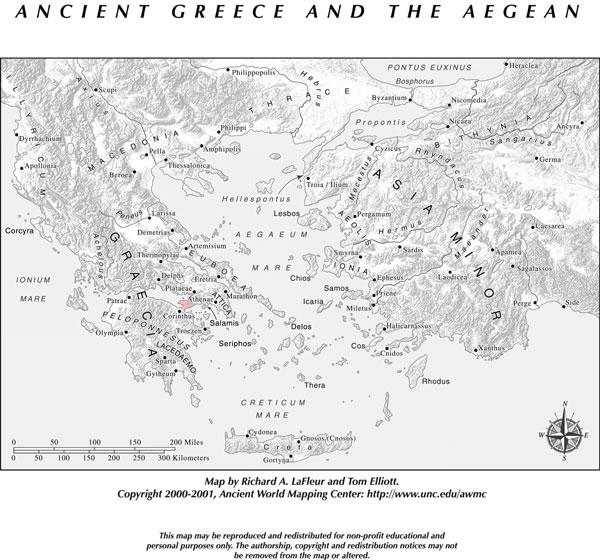An isthmus between the Saronicus Sinus and Corinthiacus Sinus, and uniting the Peloponnesus to the northern parts of Greece. Its breadth, in the narrowest part, was less than six miles (or not quite five miles). It has lately (1893) been cut by a canal. Ships were drawn, by means of machinery, from one sea to the other, near the town of Schoenus, over the narrowest part of the isthmus, which was called Diolkos. This could only be accomplished, however, with the vessels usually employed in commerce, or with [p. 411] lemboi, which were light ships of war, chiefly used by the Illyrians and Macedonians. The tediousness and expense attending this process, and still more probably the difficulty of circumnavigating the Peloponnesus, led to frequent attempts, at various periods, for effecting a junction between the two seas; but all proved equally unsuccessful. Demetrius Poliorcetes abandoned the enterprise, because it was found that the two gulfs were not on the same level. We read of the attempt having been made before his time by Periander and Alexander, and, subsequently to Demetrius, by Iulius Caesar, Caligula, Nero, and Herodes Atticus. Dio Cassius tells nearly the same story about digging through the isthmus as that which is related to travellers at this day. He says that blood issued from the ground; that groans and lamentations were heard, and terrible apparitions seen. In order to stimulate the perseverance of the people, Nero took a spade and dug himself (Dio Cass. lxiii. 16; and cf. Suet. Ner.19). Lucian informs us, that Nero was said to have been deterred from proceeding, by a representation made to him, similar to that which Demetrius received respecting the unequal levels of the two seas ( De Cleom.).The Isthmus of Corinth derived great celebrity from the games which were celebrated there every five years in honour of Palaemon or Melicerta, and subsequently of Poseidon (Pausan. i. 44). These continued in vogue when the other gymnastic exercises of Greece had fallen into neglect and disuse; and it was during their solemnization that the independence of Greece was proclaimed, after the victory of Cynoscephalae, by order of the Roman Senate and people (Polyb. xviii. 29; Liv.xxxiii. 32). After the destruction of Corinth, the superintendence of the Isthmian Games was committed to the Sicyonians by the Romans; on its restoration, however, by Iulius Caesar, the presidency of the games again reverted to the Corinthian settlers (Pausan. ii. 2). (Harpers Dictionary of Classical Antiquities, 1898)
